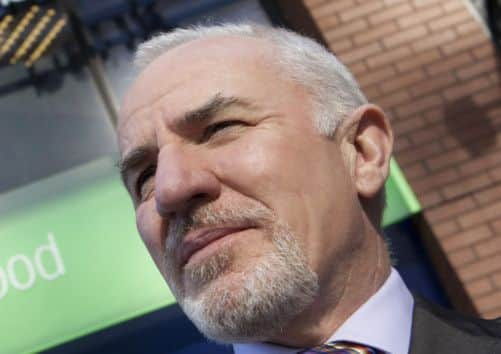Co-op move blow to bank shake-up


The Co-op said it pulled out of the deal due to toughening regulations and the worsening outlook for UK economic growth.
Lloyds, which is Britain’s biggest retail bank and has more than 2,900 branches in total, plans instead to spin-off the 632 branches under the TSB name and sell shares in the new company.
Advertisement
Hide AdAdvertisement
Hide AdIt had been hoped that the combination of the Co-op’s existing banking business with the Lloyds branches would have created a viable competitor to Britain’s established lenders.


Many of the big banks have been plagued by scandals, including the mis-selling of insurance on loans and mortgages.
Co-op chief executive Peter Marks said in a statement that the deal would not currently deliver a suitable return, in a reasonable timeframe, and with an acceptable level of risk.
Mr Marks, who lives in Bradford, said: “We have decided, at this time, that it is not in the best interests of our members to proceed with the transaction.
Advertisement
Hide AdAdvertisement
Hide Ad“Having worked closely and constructively with Lloyds we are naturally disappointed to have reached this conclusion.
“We remain committed to driving The Co-operative Group forwards under our clear strategy and, as part of that, we will continue to develop our bank for the long term, offering a real alternative on the high street with our strong, established brand and our reputation as a trusted financial services business.”
Lloyds was ordered to sell the branches by European regulators as a condition of receiving state aid during the 2008 financial crisis when Britain pumped £20.5bn into the bank, leaving taxpayers holding a 39 per cent stake. Industry sources said Lloyds will almost certainty need to request that EU regulators extend the November 2013 deadline they have set for a sale, which analysts expect to be granted.
A flotation is unlikely to be possible until the second half of 2014, according to analysts.
Advertisement
Hide AdAdvertisement
Hide AdResponding to the announcement, Which? executive director Richard Lloyd said yesterday: “This is very bad news for everyone wanting to see more competition in retail banking anytime soon.
“The Co-op’s decision is a setback to the Government’s efforts to tackle the unhealthy dominance of our biggest banks. This would have given more choice to consumers who are sick and tired of shoddy service and unfair fees and (it would have) put more pressure on the big banks to work for customers, not bankers.”
Michael Ossei, an analyst at uSwitch.com, added: “The banking revolution has got off to another false start.
“The purchase by the Co-op would have shaken up the high street and really given traditional banks a run for their money.
Advertisement
Hide AdAdvertisement
Hide Ad“As a well-liked and highly trusted brand, the Co-op deal was set to kick-start real competition in the sector. This news places a dent in the potential choice available to consumers when it comes to banking on the high street.
“That said, the news that the branches in question will now be rebranded as TSB and floated on the stock market offers a glimmer of hope to consumers.
“Despite remaining under the Lloyds umbrella, the new TSB brand has an opportunity to stand out from the crowd with new, competitive products – in particular savings, current accounts and loans. Only time will tell whether TSB will rise to the occasion.”
Britain’s ‘Big Five’ lenders – Lloyds, HSBC, Barclays, Royal Bank of Scotland and Santander UK – hold 83 per cent of current accounts.